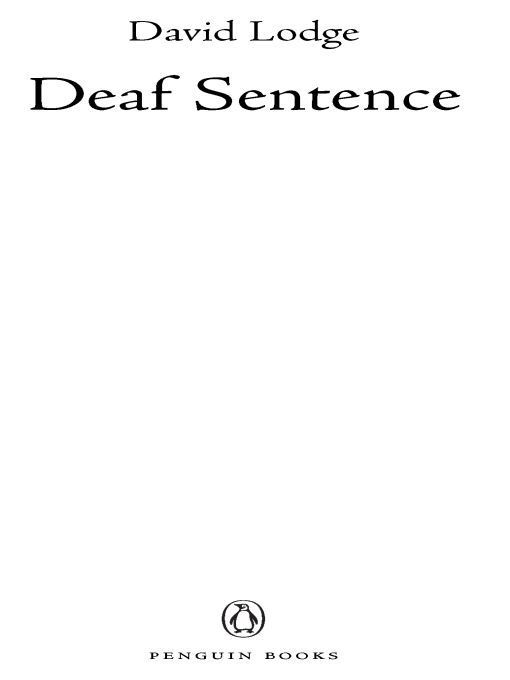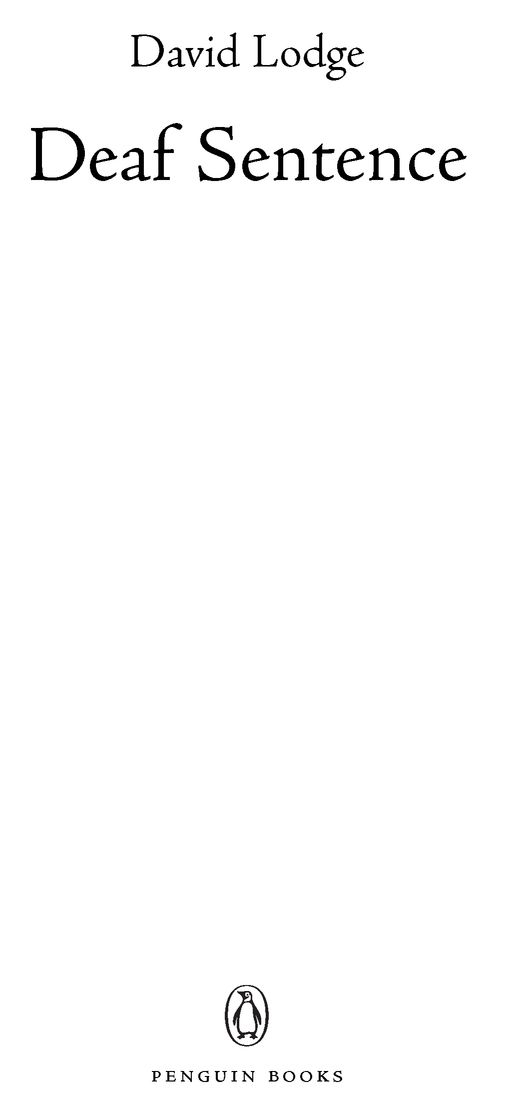Deaf Sentence
Authors: David Lodge


Table of Contents
Praise from America and England for
Deaf Sentence
by David Lodge
Deaf Sentence
by David Lodge
“
Deaf Sentence
showcases the author’s ability to use sympathy and slapstick humor to create an appealingly hapless hero and to recount his adventures with Waugh-like verve. . . . The novel occupies a similar place in Mr. Lodge’s career as
Exit Ghost
does in Philip Roth’s, and
Villages
does in John Updike’s: the book is a veteran novelist’s meditation on aging and death and the diminution of youthful dreams. . . . Lodge has written a novel that not only hits the bright comic notes of his best earlier fiction but also deftly downshifts to play the darker, more minor scales as well.”
Deaf Sentence
showcases the author’s ability to use sympathy and slapstick humor to create an appealingly hapless hero and to recount his adventures with Waugh-like verve. . . . The novel occupies a similar place in Mr. Lodge’s career as
Exit Ghost
does in Philip Roth’s, and
Villages
does in John Updike’s: the book is a veteran novelist’s meditation on aging and death and the diminution of youthful dreams. . . . Lodge has written a novel that not only hits the bright comic notes of his best earlier fiction but also deftly downshifts to play the darker, more minor scales as well.”
—Michiko Kakutani,
The New York Times
The New York Times
Deaf Sentence
is funny, all right, but it is funny in the way deafness itself is funny. . . . Here Lodge goes wider and further by creating a man who learns to be clear to the increasingly inaudible years of late life—and not only to deal with death, but also to see and, despite his encroaching affliction, to hear.”
—Roger Rosenblatt,
The Washington Post
The Washington Post
—Joyce Carol Oates,
Times Literary Supplement
(Books of the Year)
Times Literary Supplement
(Books of the Year)
—Jennifer Reese,
Entertainment Weekly
Entertainment Weekly
Deaf Sentence,
David Lodge moved beyond comic, satiric, and intellectual fiction to moral realism, teasing humor from the most unpromising subjects—deafness, aging, suicide, death, and evolution—and finding tender insights into the human condition behind the irony of the crustiest curmudgeon.”
—Elaine Showalter,
Times Literary Supplement
(Books of the Year)
Times Literary Supplement
(Books of the Year)
Deaf Sentence,
Lodge layers his lively, comic scenes with the sobriety brought on by Desmond’s thoughts on mortality. If this makes the novel sound heavy or laborious, its isn’t: Lodge has always been able to wear his erudition and philosophical interests with deceptive lightness.”
—Sylvia Brownrigg,
Los Angeles Times
Los Angeles Times
—Margaret Drabble,
The Guardian
(London)
The Guardian
(London)
Deaf Sentence
]. . . . Glows with a sepia-toned, elegiac sadness that is occasionally leavened by bright comic interludes. Desmond’s monologues are frank, funny, and captivating.”—Julia Keller,
Chicago Tribune
—Lorrie Moore,
The Guardian
(London)
The Guardian
(London)
Deaf Sentence
very much. I dread losing my own hearing, which is more or less inevitable if you live long enough, and Mr. Lodge’s hero, Desmond Bates, is in denial. What Mr. Lodge does so well is simultaneously mock and lament his hero’s predicaments.”—Cynthia Crossen,
The Wall Street Journal
—Peter Kemp,
The Sunday Times
(London)
The Sunday Times
(London)
The Seattle Times
—Alan Brownjohn,
Times Literary Supplement
Times Literary Supplement
PENGUIN BOOKS
DEAF SENTENCE
David Lodge is the author of twelve novels and a novella, including
Small World
,
Nice Work
(both of which were finalists for the Booker Prize),
Paradise News
,
Therapy
,
Thinks . . . ,
and, most recently,
Author, Author
. He has also written many works of literary criticism. He lives in Birmingham, England.
Small World
,
Nice Work
(both of which were finalists for the Booker Prize),
Paradise News
,
Therapy
,
Thinks . . . ,
and, most recently,
Author, Author
. He has also written many works of literary criticism. He lives in Birmingham, England.

PENGUIN BOOKS
Published by the Penguin Group
Penguin Group (USA) Inc., 375 Hudson Street, New York, New York 10014, U.S.A.
Penguin Group (Canada), 90 Eglinton Avenue East, Suite 700, Toronto,
Ontario, Canada M4P 2Y3
(a division of Pearson Penguin Canada Inc.)
Penguin Books Ltd, 80 Strand, London WC2R 0RL, England
Penguin Ireland, 25 St Stephen’s Green, Dublin 2, Ireland (a division of Penguin Books Ltd)
Penguin Group (Australia), 250 Camberwell Road, Camberwell,
Victoria 3124, Australia (a division of Pearson Australia Group Pty Ltd)
Penguin Books India Pvt Ltd, 11 Community Centre, Panchsheel Park, New Delhi - 110 017, India
Penguin Group (NZ), 67 Apollo Drive, Rosedale, North Shore 0632,
New Zealand (a division of Pearson New Zealand Ltd)
Penguin Books (South Africa) (Pty) Ltd, 24 Sturdee Avenue,
Rosebank, Johannesburg 2196, South Africa
Penguin Books Ltd, Registered Offices:
80 Strand, London WC2R 0RL, England
First published in Great Britain by Harvill Secker,
an imprint of Random House Group Limited 2008
First published in the United States by Viking Penguin, a member of Penguin Group (USA) Inc. 2008
Published in Penguin Books 2009
All rights reserved
Grateful acknowledgment is made for permission to reprint the following coyprighted works: “Days” and excerpt from “Aubade” from
Collected Poems
by Philip Larkin. Copyright © 1988, 2003 by the Estate of Philip Larkin.
Collected Poems
by Philip Larkin. Copyright © 1988, 2003 by the Estate of Philip Larkin.
“Inside Our Dreams” from
Toffee Pockets
by Jeanne Willis, published by Bodley Head/Red Fox.
Toffee Pockets
by Jeanne Willis, published by Bodley Head/Red Fox.
Excerpt from “Clearing” from
Collected Poems
by Tony Harrison (Penguin Books Ltd, 2007).
Collected Poems
by Tony Harrison (Penguin Books Ltd, 2007).
By kind permission of the author.
PUBLISHER’S NOTE
This is a work of fiction. Names, characters, places, and incidents are either the product
of the author’s imagination or are used fictitiously, and any resemblance to actual persons,
living or dead, business establishments, events, or locales is entirely coincidental.
of the author’s imagination or are used fictitiously, and any resemblance to actual persons,
living or dead, business establishments, events, or locales is entirely coincidental.
Lodge, David, 1935-
Deaf sentence / David Lodge. p. cm.
eISBN : 978-1-101-14056-7
1. Older deaf people—Fiction. 2. Aging—Fiction. 3. Marital conflict—Fiction.
4. Psychological fiction. I. Title.
PR6062.O36D’.914—dc22 2008001772
The scanning, uploading and distribution of this book via the Internet or via any other means
without the permission of the publisher is illegal and punishable by law. Please purchase only
authorized electronic editions, and do not participate in or encourage electronic piracy
of copyrighted materials.Your support of the author’s rights is appreciated.
without the permission of the publisher is illegal and punishable by law. Please purchase only
authorized electronic editions, and do not participate in or encourage electronic piracy
of copyrighted materials.Your support of the author’s rights is appreciated.
Dedication
Conscious that this novel, from its English title onwards, presents special problems for translators, I dedicate it to all those who, over many years, have applied their skills to the translation of my work into various languages, and especially to some who have become personal friends: Marc Amfreville, Mary Gislon and Rosetta Palazzi, Maurice and Yvonne Couturier, Armand Eloi and Beatrice Hammer, Luo Yirong, Suzanne Mayoux, Renate Orth-Guttmann, and Susumu Takagi.
D.L.
Sentence
noun
. Middle English [Old French from Latin
sententia
mental feeling, opinion, philosophical judgement, from
sentire
feel]
1
. Way of thinking, opinion, mind . . .
2b
. The declaration in a criminal court of the punishment imposed on a person pleading guilty or found guilty . . .
5
. A pithy or memorable saying, a maxim, an aphorism . . .
7
. . . A piece of writing or speech between two full stops or equivalent pauses.
noun
. Middle English [Old French from Latin
sententia
mental feeling, opinion, philosophical judgement, from
sentire
feel]
1
. Way of thinking, opinion, mind . . .
2b
. The declaration in a criminal court of the punishment imposed on a person pleading guilty or found guilty . . .
5
. A pithy or memorable saying, a maxim, an aphorism . . .
7
. . . A piece of writing or speech between two full stops or equivalent pauses.
The New Shorter Oxford English Dictionary
1
THE tall, bespectacled, grey-haired man standing at the edge of the throng in the main room of the gallery, stooping very close to the young woman in the red silk blouse, his head lowered and angled away from her face, nodding sagely and emitting a phatic murmur from time to time, is not as you might think an off-duty priest whom she has persuaded to hear her confession in the midst of the party, or a psychiatrist conned into giving her a free consultation; nor has he adopted this posture the better to look down the front of her blouse, though this is an accidental bonus of his situation, the only one in fact. The reason for his stance is that the room is full of noise, a conversational hubbub which bounces off the hard surfaces of the ceiling, walls and floor, and swirls around the heads of the guests, causing them to shout even louder to make themselves heard.This is known to linguists as the Lombard Reflex, named after Etienne Lombard, who established early in the twentieth century that speakers increase their vocal effort in the presence of noise in the environment in order to resist degradation of the intelligibility of their messages. When many speakers display this reflex simultaneously they become, of course, their own environmental noise source, adding incrementally to its intensity. For the man now almost nuzzling the bosom of the woman in the red blouse, as he brings his right ear closer to her mouth, the noise reached some time ago a level that makes it impossible for him to hear more than the odd word or phrase of those she addresses to him. ‘Side’ seems to be one recurring word - or is it ‘cider’? And ‘flight from hell’ - or was it ‘cry for help’? He is, you see, ‘hard of hearing’, or ‘hearing impaired’ or, not to put too fine a point on it, deaf - not profoundly deaf, but deaf enough to make communication imperfect in most social situations and impossible in some, such as this one.
Other books
A Short Trip To Hell: Hellcat Series Origins Volume 1 by Sharon Hannaford
Mere Anarchy by Woody Allen
Rebound Envy (Rebound #2) by Jerica MacMillan
Center of Gravity by Laura McNeill
Calm Like Home by Clark, Kaisa
The Design of Everyday Things by Don Norman
Curves and the Rodeo Star (BBW Romance - Coldwater Springs 4) by Roseton, Jenn
Never Marry a Warlock by Tiffany Turner
Every Which Way But Dead by Kim Harrison
Uncharted Waters by Linda Castillo
